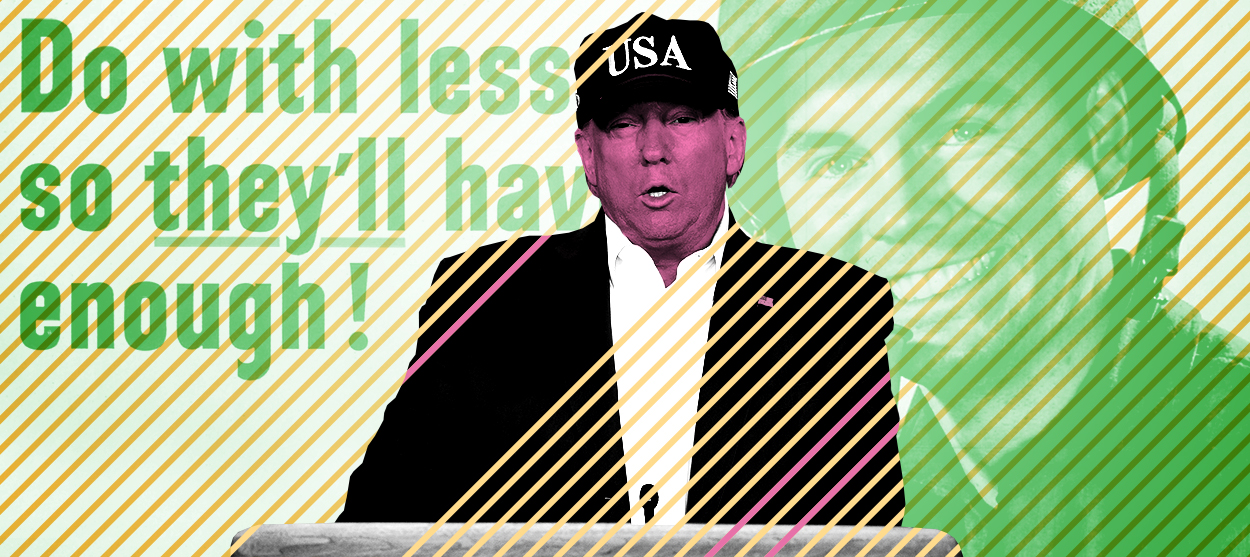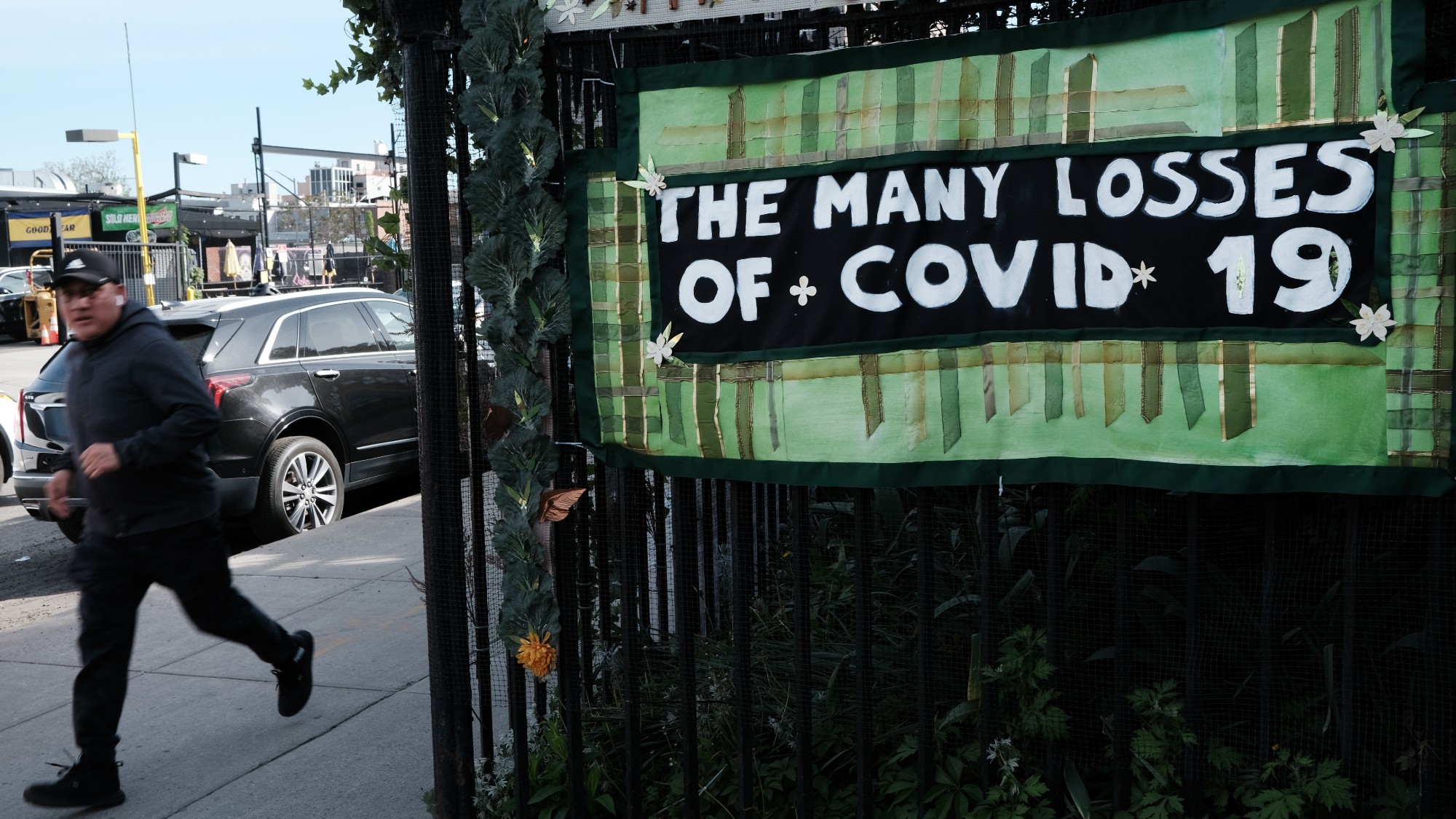Coronavirus is exposing America's shameful selfish streak
We have forgotten how to make sacrifices for each other. We have forgotten that we should.


A free daily email with the biggest news stories of the day – and the best features from TheWeek.com
You are now subscribed
Your newsletter sign-up was successful
During World War II, Americans of all stripes pitched in to win the war against the Axis powers. While soldiers, sailors, airmen and Marines fought in Europe and the Pacific, the citizens who stayed home helped the effort by doing with a little less. In what might now be called an "all of America" approach, every family — even that of President Franklin Roosevelt — was subject to rationing. They accepted limits on the amount of meat, sugar, and other foodstuffs their families could buy, and they repaired car tires instead of buying new ones, so that those critical supplies could be used to feed and arm the troops. People made sacrifices for the sake of the greater good.
"Do with less so they'll have enough!" pleaded a propaganda poster featuring a smiling soldier. "Rationing gives you your fair share."
That was the 1940s. These days, Americans can't even give up a Saturday night at the bar. We have forgotten how to make sacrifices for each other. We have forgotten that we should.
The Week
Escape your echo chamber. Get the facts behind the news, plus analysis from multiple perspectives.

Sign up for The Week's Free Newsletters
From our morning news briefing to a weekly Good News Newsletter, get the best of The Week delivered directly to your inbox.
From our morning news briefing to a weekly Good News Newsletter, get the best of The Week delivered directly to your inbox.
The coronavirus crisis facing both this country and the world might well end up being our biggest challenge since World War II. President Trump on Friday finally declared a national emergency, and health authorities pleaded continually with Americans to adopt "social distancing" measures like working from home and maintaining a distance of six feet from each other. The reason? Even young people — who don't face as much risk of death from the virus as older folks — can pass the virus along in crowded places. Self-isolation is the order of the day.
Saturday night, though, bars and restaurants across the country were full.
Reports spilled in from packed bars in Manhattan, crowds filling downtown Nashville, and busy restaurants in Oklahoma City. Some people said they were trying to help their local businesses survive the certain economic devastation that will accompany the coronavirus lockdown, but many folks were simply defiant.
"I just went to a crowded Red Robin and I'm 30," one young woman tweeted in response to Rep. Alexandria Ocasio-Cortez's (D-N.Y.) plea for people to stay home. "It was delicious, and I took my sweet time eating my meal. Because this is America. And I'll do what I want."
A free daily email with the biggest news stories of the day – and the best features from TheWeek.com
Those are words — "I'll do what I want" — that could end up killing people.
To be fair, it is clear the young woman is far from alone in her conception that "America" means doing whatever you want, even if it risks harming your neighbors. She's far from alone in believing the animating idea of this country is a sort of freedom from any responsibility to our fellow citizens.
Just under half of Americans said they planned to stop attending large public gatherings, according to a poll conducted last week by NBC and the Wall Street Journal. Barely a third said they had canceled or planned to cancel travel. And just a quarter said they had stopped or planned to stop eating out at restaurants.
Those numbers are dramatically skewed by the numbers of Republicans who were refusing to make lifestyle changes: Just 30 percent said they were avoiding large gatherings, 23 percent were skipping travel and just 12 percent were staying away from restaurants.
Who could blame them? The Republican president keeps telling the country he's got everything under control, even as experienced health professionals warn the worst is yet to come. Officials like Oklahoma Governor Kevin Stitt and Congressman Devin Nunes (R-California) spent the weekend encouraging people to go out. Some, like former Milwaukee Sheriff David A. Clarke Jr., did so to "push back" against the liberals telling them to stay home. Why should Americans worry — why should they sacrifice a good time — if their leaders tell them otherwise?
It is our great fortune that we haven't much been called upon to make real sacrifices since World War II. We're not just out of practice, though — the concept of the "greater good" has taken a real beating in recent decades, in favor of a mythical rugged individualism that claims the virtue of self-sufficiency and dismisses any sense of responsibility to each other as a form of socialism.
The end result: "This is America. And I'll do what I want." And everybody else can go to hell.
In the absence of leadership to guide us, it has ended up the responsibility of individuals and business owners to look out for their communities. In my hometown of Lawrence, Kansas, a popular downtown eatery announced late Saturday it is voluntarily shutting down for two weeks — because customers were still filling the place. Other establishments soon followed suit, or cut back to delivery-only options. In New York, a Time correspondent ran past brunch hot spots in Brooklyn carrying a sign telling customers to "Go the (bleep) HOME." More mandatory restrictions are on the way this week, but too often, our elected leaders have been slow to do what is necessary, if painful.
This crisis is likely to get worse before it gets better. We Americans can better help each other if we are prepared to make sacrifices for each other over the next few months. It seems we have forgotten how. The time to relearn is now.
Want more essential commentary and analysis like this delivered straight to your inbox? Sign up for The Week's "Today's best articles" newsletter here.
Joel Mathis is a writer with 30 years of newspaper and online journalism experience. His work also regularly appears in National Geographic and The Kansas City Star. His awards include best online commentary at the Online News Association and (twice) at the City and Regional Magazine Association.
-
 Why are election experts taking Trump’s midterm threats seriously?
Why are election experts taking Trump’s midterm threats seriously?IN THE SPOTLIGHT As the president muses about polling place deployments and a centralized electoral system aimed at one-party control, lawmakers are taking this administration at its word
-
 ‘Restaurateurs have become millionaires’
‘Restaurateurs have become millionaires’Instant Opinion Opinion, comment and editorials of the day
-
 Earth is rapidly approaching a ‘hothouse’ trajectory of warming
Earth is rapidly approaching a ‘hothouse’ trajectory of warmingThe explainer It may become impossible to fix
-
 The billionaires’ wealth tax: a catastrophe for California?
The billionaires’ wealth tax: a catastrophe for California?Talking Point Peter Thiel and Larry Page preparing to change state residency
-
 Bari Weiss’ ‘60 Minutes’ scandal is about more than one report
Bari Weiss’ ‘60 Minutes’ scandal is about more than one reportIN THE SPOTLIGHT By blocking an approved segment on a controversial prison holding US deportees in El Salvador, the editor-in-chief of CBS News has become the main story
-
 Has Zohran Mamdani shown the Democrats how to win again?
Has Zohran Mamdani shown the Democrats how to win again?Today’s Big Question New York City mayoral election touted as victory for left-wing populists but moderate centrist wins elsewhere present more complex path for Democratic Party
-
 Millions turn out for anti-Trump ‘No Kings’ rallies
Millions turn out for anti-Trump ‘No Kings’ ralliesSpeed Read An estimated 7 million people participated, 2 million more than at the first ‘No Kings’ protest in June
-
 Ghislaine Maxwell: angling for a Trump pardon
Ghislaine Maxwell: angling for a Trump pardonTalking Point Convicted sex trafficker's testimony could shed new light on president's links to Jeffrey Epstein
-
 The last words and final moments of 40 presidents
The last words and final moments of 40 presidentsThe Explainer Some are eloquent quotes worthy of the holders of the highest office in the nation, and others... aren't
-
 The JFK files: the truth at last?
The JFK files: the truth at last?In The Spotlight More than 64,000 previously classified documents relating the 1963 assassination of John F. Kennedy have been released by the Trump administration
-
 'There is a certain kind of strength in refusing to concede error'
'There is a certain kind of strength in refusing to concede error'instant opinion 'Opinion, comment and editorials of the day'
